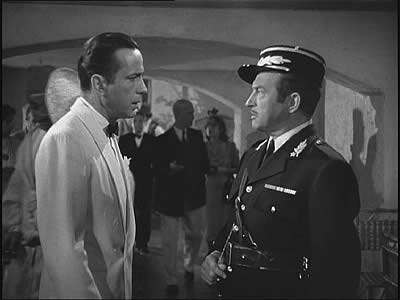The other day, I posted some remarks on why the Freedom Train
metaphor bugs me, and why I think that market anarchists should generally think about aligning themselves with, you know, anarchist organizations, rather than minarchist efforts like the Libertarian Party and Chairman Ron’s Great Libertarian Electoral Revolution. Brian Doherty kindly took notice of my post over at Hit and Run. Like most posts at Hit and Run, it provoked a lot of comments, mostly from the usual suspects, and mostly not going much of anywhere productive. (Several minarchist commenters apparently didn’t bother to read the post, as they would rather spend their time rehashing the minarchist-anarchist debate from the get-go. Did you know that anarchy might work on the small scale, but will never work in a big, industrialized society? Or that anarchy will never work in practice because people will have to recreate the State to keep the Mafia from running everything? Man, I never heard that stuff before. Sign me up for some of that limited government!)
However, there are a few that are worth some remark.
NoStar offers the following encouraging thought on anarchist-minarchist unity:
How about we both fight and defeat them before we then turn and fight each other.
Think of Mao’s communists and Chang Kai-Chek’s nationalists combining to fight the Japanese.
Once the common foe is gone, we can nitpick the details.
— NoStar, 25 January 2008, 8:35pm
Call me a nattering nabob of negativism, but somehow I fail to be entirely reassured by the thought of being Chiang Kai-shek to the minarchists’ Mao Zedong. Or, for that matter, vice versa.
Moderate or pragmatist limited government libertarian Nick has this to say:
The way to effect change is to build a coalition of people who are dedicated to the change you want to make and then work to convince the normal people in the middle. Ron Paul is a great example of getting a coalition together, altho his campaign could use some work in convincing moderates to his side.
— Nick, 26 January, 10:24am
Well then.
In the interest of diplomacy, I will just kindly suggest that if Ron Paul’s triumphant single-digit, third-to-fourth place primary campaign is your idea of a great example of getting a coalition together
and making change through the power of numbers, I will be holding out for a better proposal.
Meanwhile, limited governmentalists are just full of suggestions for how anarchists can help the cause of anarchy by … not talking about anarchy, and spending their time and energy on building up limited-government organizations instead. Apparently wanting to work on promoting your own cause, rather than other causes with fundamentally different ideas about ultimate goals, is a sign of a self-destructive fetish for purity. Of course, the fact that this going-along-to-get-along in the name of political realism only seems to go in one direction — I don’t hear any minarchists talking about how they plan to swallow their love of small governments in order to sign up for going anarchist efforts, like, say, CopWatch — might lead one to be just a little suspicious of the motives behind the appeal. But, anyway.
Brandybuck, for example, is not an anarchist. But he’s sure that if he were an anarchist, he’d be perfectly happy to spend his time working on achieving minarchy rather than anarchy. He asks:
He is unwilling to compromise any of his political points. But such an unwavering demand for pure anarchy is going to net him only misery. Is this a man who would reject a 50% tax cut because it would leave the remaining 50% of taxes in place? I think it might be.
— Brandybuck, 25 January 25 2008, 9:38pm
Brandybuck’s got another think coming.
I would quite happily take a 50% tax cut, if I could get it; and I would consider a 50% reduction in Leviathan’s pirated wealth to be a massive step in the right direction. I would much rather that the whole thing were done away with, but in the meantime, I will take what I can get.
But what I would not do is waste my time trying to build up a think tank or political party that are devoted to the goal of cutting taxes by 50% and no further. That’s hardly the only way in the world to make concrete progress towards cutting taxes by 50%, and if you think that it is, you need to think harder about how social change, or even basic negotiations, actually work in the real world. (As for negotiations, if you start out asking for what you actually want, rather than what you think you can get, you’ll often end up getting less than you wanted in the end. But you’ll do a damn sight better than if you start out asking for what you think you can get, and then bargain down from there. As for social change, there are a hell of a lot more movements that have made substantial social changes than there are political parties or party caucuses. If you think that the only way to get things done is to jump into a political party, then your lack of creativity is a problem for you, not a problem for me.)
Brandybuck is also incensed that I would claim that limited government
libertarians actually do believe in government:
Personally, I have no desire to join any movement whose members [minarchists] will turn around and shoot me in the end.
This is a vile mischaracterization of minarchists. Minarchists are not statists. They are anti-statists. What makes them different from anarchists is the pragmatic realization that anarchy is not viable. If a state is inevitable, then let’s see to it that it will be as small and as unobtrusive as possible.
— Brandybuck, 25 January 25 2008, 9:38pm
This is, to be blunt, complete nonsense. If minarchists believe in limited government, then they believe in the right to make anarchistic arrangements not viable
by prohibiting at least some individual people from seceding or otherwise withdraw their allegiance from the minimal state
in favor of competing defense associations, or in favor of individual self-defense. If Brandybuck believes that I have the right to tell his limited government to go to limited hell, and to withdraw entirely from it to make my own arrangements, then his imagined minimal state is really not a sovereign state at all, but rather one voluntary defense association amongst many, and Brandybuck is no minarchist, but rather an anarchist. (In which case, welcome, comrade!) But if he does believe that a limited government
has some right to make me use or pay for its services,
even if I would prefer to withdraw from it and make arrangements of my own, then, like any other government program, this one is going to take the use of force or the threat of force by limited government cops. In which case my characterization of the minarchist political platform as including a plank on shooting anarchists, whether vile
or not, is an accurate one. There is no third option. (Of course, minarchists accept a right of free speech, meaning that they will not shoot anarchists who just talk about anarchy. But in order to maintain a minimal state, they have to be ready to shoot anarchists who actually attempt to do something about it. And I care about the latter at least as much, if not more, than I care about the former.)
A bunch of people seem to have misinterpreted my argument as an argument for not doing anything,
or for anarchists never to work together with minarchists on issues of common concern. Thus, for example:
Great. The metaphor’s nonsensical. Let’s stop working together against the great breadth of government power.
— Vent, 25 January 2008 7:43pm
Of course, if I had made an argument to the effect that working together
with limited statists was always and everywhere destructive to the cause of freedom, then replying to the argument this way would be about as sensible as saying Great. Let’s stop trying to put out this fire by pouring gasoline on it.
Well, yeah, that’s what you should do. If working together
requires you to make trade-offs that actively impede the goals you’re supposedly working for, then you should stop trying to work together.
The primary goal of libertarianism ought to be freedom, not maximizing the number of self-identified libertarians working together.
The two are not the same, and if latter interferes with the former, then the former is always more important.
That said, that’s not the argument that I made. I’m not proposing that anarchists sit around and do nothing; I am proposing that they choose different means in order to get things done. Nor am I proposing that anarchists never work together with minarchists on anything. I’m willing to work with all kinds of people. I am proposing that we reconsider the scope of the cooperation, and the terms on which we do the work. As I said in the original post:
I would certainly agree that market anarchists should be willing to work together with coalition partners on particular issues of concern — the drug war, corporate welfare, the war on Iraq, etc. — whether those coalition partners are minarchists, or state Leftists, or whatever else. But who you’ll work with in issue-based coalitions is a different question from whose movement you’ll participate in, or what formations you’ll make the primary venue for your broader organizing and activism.
Here, as elsewhere, I’d argue that there’s a lot to be said for making things with small pieces loosely joined. There are plenty of times when it makes sense for anarchists to work together with statists of various stripes, as part of a common front for a common cause. But when we do, I’d suggest that the cooperation should be limited to fighting to win on the issue at hand — not spending years building up multi-purpose, long-term institutions or political parties whose goals have nothing in particular to do with anarchism. And I’d suggest that when we work in coalition, we do so through organizations of our own, on our own terms, and speaking for ourselves, not through centralized, non-anarchist smaller-government organizations that require us to spend our time talking about everything but, y’know, anarchy, in order to participate.
Probably the most common critical reply, though, is a claim that anarchists should work to build up minarchist parties because (1) in the current political climate, the practical differences between anarchistic and minarchistic politics are triflingly small (minarchists want to get rid of about 99% of existing government; anarchists want to get rid of the remaining 1% too); (2) where there are differences in ultimate goals, in the current political climate, the stuff that only the anarchists want to get rid of can’t realistically be gotten rid of, whereas some of the stuff that both anarchists and minarchists want to get rid of can realistically be gotten rid of (the war on drugs, or marginal tax rates, or whatever); and (3) once we have gotten rid of the 99% of stuff that anarchists and minarchists agree on, whenever that happens, then getting rid of that last 1% will be much easier for anarchists to pull off than it would be to get rid of that stuff now.
Thus Zeph, in comments here:
A minarchist system would have minimal ability to block the tracks
, even if it had an interest in so doing.
Sisyphus old lad, would you rather push a pebble or a planet up a hill?
And Brandybuck, who, while a minarchist, is ever helpful to inquisitive anarchists:
I also suspect that it would be much easier to achieve true anarchy if you start from a minarchist state than from an maxarchist state.
On the train
anarchist kerem tibuk:
Besides when the time comes when a minarchist government agresses against an individual it is much easier for that individual to fight back since the state would be much less powerless and the individual much more powerfull.
prolefeed:
Ummm, when we get to a government that is about 1% the size it is now, this will become a relevant question. Not exactly holding my breath over that happening. Until we effing reverse the growth of government, the 0%ers and the 0.01%ers and the 1%ers and the 50%ers and even the 99%ers should all be pretty solid allies.
But accepting this argument would depend on my accepting a number of premises whose evidence is weak at best, or which are definitely wrong.
I would, for example, have to accept that a smaller, more limited government would have a harder time suppressing anarchistic activity than a larger, less limited government would. It might seem like this is obvious: bigger governments have more money, more hired thugs, more surveillance spooks, and more tyrannical laws that they can exercise in order to suppress anarchists than smaller governments do. But, on the other hand, bigger governments also have much more to do than smaller governments do. Under the present system, government cops fritter away time, attention, and energy trying to enforce all kinds of asinine laws. Under a minarchy, the government police forces would still exist, but they would have basically nothing to do with their time other than (1) dealing with small-time property crime, and (2) suppressing anarchistic activity. I think there’s very little guarantee that it would be easier to establish and sustain institutions that counter certain kinds of state power when the state is lean and mean, than there is now when it’s large, bloated, and corrupt.
In a similar vein, I would have to accept that the most likely way to significantly reduce the scope and power of government is to spend the next several decades working from within the state system in order to prune away this or that invasive policy — drug laws, abortion laws, immigration laws, the war in Iraq, especially stupid provisions of copyright law, egregiously high taxes, the most outrageous parts of immigration law, or whatever — and then only to go after the supporting pillars of state power — government policing and prisons, government courts, government military, government border control,
the existence of even minimal taxation, etc. — once all the policy issues have been cleared out of the way. That may seem obvious, but actually it’s a substantial claim in need of defense, and I have not yet been given any reason to believe that this is true.
Of course, it’s true that if you have already committed yourself to making change through the vehicle of electoral politics, then partial reform on the particular policy issues is going to be much closer to being within your grasp than, say, abolishing government policing in favor of voluntary defense associations. But that’s only if you’ve committed yourself to electoral politics already; it certainly can’t be invoked as an argument for jumping into the Libertarian Party without assuming part of what it needs to prove. In point of fact, if options other than electoral politics are allowed onto the table, then it might very well be the case that exactly the opposite course would be more effective: if you can establish effective means for individual people, or better yet large groups of people, to evade or bypass government enforcement and government taxation, then that might very well provide a much more effective route to getting rid of particular bad policies than getting rid of particular bad policies provides to getting rid of the government enforcement and government taxation.
To take one example, consider immigration. If the government has a tyrannical immigration law in place (and, just to be clear, when I say tyrannical,
I mean any immigration law at all), then there are two ways you could go about trying to get rid the tyranny. You could start with the worst aspects of the law, build a coalition, do the usual stuff, get the worst aspects removed or perhaps ameliorated, fight off the backlash, then, a couple election cycles later, start talking about the almost-as-bad aspects of the law, build another coalition, fight some more, and so on, and so forth, progressively whittling the provisions of the immigration law down until finally you have whittled it down to nothing, or as close to nothing as you might realistically hope for. Then, if you have gotten it down to nothing, you can now turn around and say, Well, since we have basically no restrictions on immigration any more, why keep paying for a border control or internal immigration cops? Let’s go ahead and get rid of that stuff.
And then you’re done.
The other way is the reverse strategy: to get rid of the tyranny by first aiming at the enforcement, rather than aiming at the law, by making the border control and internal immigration cops as irrelevant as you can make them. What you would do, then, is to work on building up more or less loose networks of black-market and grey-market operators, who can help illegal immigrants get into the country without being caught out by the Border Guard, who provide safe houses for them to stay on during their journey, who can help them get the papers that they need to skirt surveillance by La Migra, who can hook them up with work and places to live under the table, etc. etc. etc. To the extent that you can succeed in doing this, you’ve made immigration enforcement irrelevant. And without effective immigration enforcement, the state can bluster on as much as it wants about the Evil Alien Invasion; as a matter of real-world policy, the immigration law will become a dead letter.
When anarchists participate in compromise efforts, such as the LP or the Ron Paul campaign, those efforts pretty much always only allow one of these two routes: the policy-reform-first route. They don’t allow for the evasion-first route because to set up and sustain the kind of resources that are necessary to enable evasion and resistance of government laws, you’re already trying to take the train to a station where the minarchist passengers don’t want to go: that is, you’re creating counter-institutions that are directly competing with, and attempting to undermine, precisely those state functions (law enforcement, the courts, military and paramilitary defense of the state against its declared enemies) that minarchists intend to keep. But why should we prejudge the contest in favor of the minarchist-friendly route? After all, which of these is the better strategy for getting rid of immigration laws? Well, as far as effectiveness goes, I don’t actually think that that’s a very hard question to answer. Look at all the practical success that the immigration reform movement has had in liberalizing immigration laws over the past thirty years or so. Here, I’ll make a list for your convenience:
…
Now, compare the success that illegal immigrants, state-side family members, coyotes, good samaritan ranchers, off-the-books employers, et al. have had in getting people across the border in defiance of immigration law, while avoiding or minimizing government interference:
From a practical standpoint, if I’m looking for a going concern, I’d say that the root-striking approach seems to be making a lot more concrete progress than the branch-pruning approach, at least on the specific issue of immigration.
Of course, there are concerns other than practical success. For example, many minarchists are likely to believe that there is a moral advantage to working from within the political system, and convincing those around you to change their votes, rather than consorting with criminals and making an end-run around the law. That’s reasonable enough, and may be a reason to stick to electoral reform — if you are a minarchist. But, of course, I’m not: I’m an anarchist; I think that government laws have no color of authority whatsoever; and I don’t think that people who evade or defy immigration laws are criminals in any sense worth caring about. And my earlier post was directed mainly towards other anarchists on a point of anarchist strategy; so if your counter-argument starts out by presupposing a certain level of respect for government law, then it’s going to be a non-starter as a response to my argument.
Setting moral concerns aside, there is a pragmatic concern that strategies that bypass legal reform in order to evade the law are more risky. Electoral reform campaigns may not get the results as quickly or as extensively as black markets do, but they’re also less likely to get you shot or thrown in jail by the government. That’s true enough. But, on the other hand, it’s easy to overestimate the risks of black market activities; the fact is that tens of millions of people get away with this stuff every day already, and the more talented and resourceful people turn their attention towards evading and resisting tyrannical laws rather than pouring their resources down the toilet of political reform campaigns, the more people will be able to get away with, and the more reliably they’ll be able to get away with it. Moreover, just as there is far more to political campaigning than just the act of voting or declaring a candidacy or lobbying or filing suit — there’s also fundraising, crafting and running ads, house parties, holding debates, canvassing, op-eds, buttons, bumperstickers, and the rest — there is also much more to an evasion strategy than direct participation in black market activities. There is also moral agitation and advertising aimed at convincing people of the legitimacy, or at least the unimportance, of so-called criminal activity
, with the usual set of op-eds, buttons, bumperstickers, debates, etc.; there’s legal education and legal defense funds; there’s nonviolent civil disobedience; there are grey market
activities that provide arguably or completely legal services that nevertheless help black market operators evade detection; and any number of other things, too. No doubt lots of us can’t or won’t take the risks involved in direct black market activity — because our circumstances or our temperament prevent us from taking it on — but if you can’t take on that much risk, you can still do plenty of things to concretely aid the broader strategy, without putting yourself in the path of the law.
Now, for all that I’ve said, it still may be the case that, for some other issues, the branch-pruning approach is more likely to be effective than the root-striking approach. But if you are an anarchist, then I think it would behoove you to think carefully about whether this really is the case, before you start putting your limited time and energy into a branch-pruning political campaign. Certainly there are plenty of examples I could cite other than illegal immigration. Compare the concrete progress of lobbying and litigation for liberalizing copyright law to the concrete progress of music and movie pirates in simply evading the enforcement of copyright law. Or compare the concrete progress of lobbyists at liberalizing drug laws to the concrete progress of drug smugglers and drug dealers at moving drugs to willing customers in spite of the laws against it. However many policy issues there may be that will be more easily addressed by the route of legal reform, rather than by the route of undermining the state’s capacity to detect and retaliate against law-breaking, I think there is every reason that they will be few enough, and far enough between, that it just doesn’t make practical sense for anarchists to spend their limited resources on open-ended, long-term commitments to building up smaller-government institutions. Not if the price is deferring talk about the illegimacy of the State as such, or about the right of people to evade its laws, or about the right of people to create counter-institutions to defend themselves against its law enforcement, in order to keep our outreach palatable to more or less limited statists. Anything that is worth getting through that kind of co-operation can be got through limited-scope, issue-driven coalitions. And we can do that kind of outreach and activism without signing onto intra-party Accords
that sacrifice anarchist rhetoric or practical action in the name of taking one for the party.
Anarchism is about anarchy. The activism, agitation, and organizing that we do ought to reflect that. If it doesn’t, then you may very well be wasting your time and talents.









